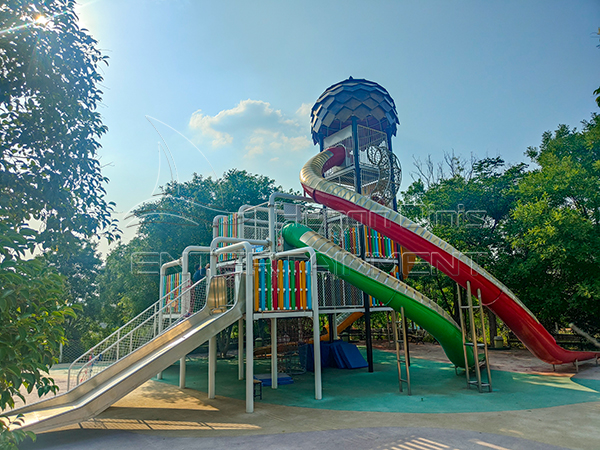Materials and advantages of outdoor slides
Common outdoor slides are essential components of playgrounds, parks, and recreational areas, providing children with a thrilling and enjoyable play experience. These slides come in various materials, each offering unique advantages in terms of durability, safety, maintenance, aesthetics, and overall play value. In this description, we will explore the materials commonly used in outdoor slides and discuss their advantages.

Metal Slides: Metal slides are a popular choice due to their durability and strength. They are typically constructed using aluminum or steel, making them robust and capable of withstanding heavy use and harsh weather conditions. Some advantages of metal slides include:
1. Durability: Metal slides are known for their long-lasting nature. They are resistant to wear and tear, ensuring they can withstand years of play without significant damage.
2. Stability: Metal slides offer stability and support, allowing children to slide safely. They have a rigid frame that provides a secure structure during use.
3. Low Maintenance: Metal slides require minimal maintenance. They are resistant to rust, and some are coated with a powder finish, reducing the need for frequent painting or repainting.
Plastic Slides: Plastic slides are another prevalent material choice for outdoor play structures. They are typically made from high-density polyethylene (HDPE), a durable and lightweight plastic material. Plastic slides offer several advantages, including:
1. Color Variety: Plastic slides are available in a wide range of colors, allowing for vibrant and visually engaging play structures. The colorful nature of plastic slides can attract children and stimulate their imagination.
2. Low Maintenance: Plastic slides are low maintenance and resistant to rust, splintering, and UV rays. They do not require painting or staining, making them an economical choice in terms of upkeep.
3. Lightweight: Plastic slides are lightweight, making them easier to install and move when necessary. This feature can be advantageous in situations where play structures need to be relocated or adjusted.
Wood Slides:
Wood slides offer a natural and rustic appeal to outdoor play structures. They are typically constructed using pressure-treated lumber, such as cedar or redwood, which provides resistance to rot, decay, and insect infestation. Advantages of wood slides include:
1. Durability: Properly treated wood slides are durable and can withstand outdoor conditions. They have the advantage of resisting rot and decay, ensuring a longer lifespan.
2. Customization: Wood slides can be customized to fit specific design requirements. They can be stained or painted in various colors, offering flexibility in matching the overall theme of the playground or park.
3. Eco-Friendly: Wood slides are considered more environmentally friendly compared to other materials. Wood is a renewable resource, and using sustainably sourced lumber can contribute to a more eco-conscious playground design.
In conclusion, the choice of materials for outdoor slides depends on various factors such as durability, safety, maintenance, aesthetics, and play value. Metal slides offer durability and design flexibility, plastic slides provide safety and color options, and wood slides offer a natural aesthetic and tactile experience. Each material has its advantages, ensuring that there is a suitable option for different playground environments and design preferences.
